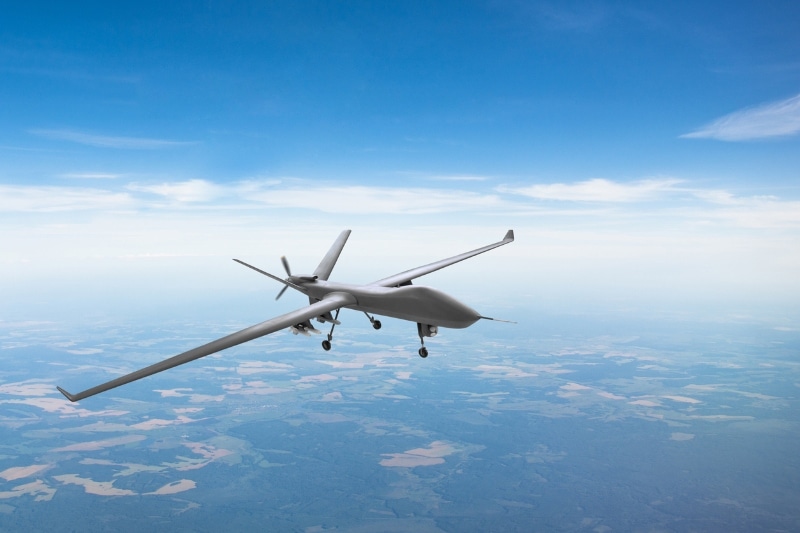Growing Demand for Unmanned Aerial Systems (UAS) in Singapore
Singapore intends to operate with a one-third reduction in manpower for its conscription-dependent armed forces by 2030. To address this challenge, the city-state is investing heavily in unmanned aerial systems (UAS) to enhance its defense capabilities. The Singapore Army and Air Force have already deployed drones to provide real-time battlefield intelligence via the Mobile Imagery Intelligence Dissemination System (MINDIS), allowing precise identification of enemy locations.
Building on these efforts, Singapore and the United States have continued testing advanced drone swarm technologies during Exercise Forging Sabre, where autonomous UAVs are integrated into military operations. The Singapore Army is also expanding its use of autonomous drone teams, particularly for tactical operations such as urban reconnaissance, building searches, and vehicle tracking.
Foreign companies are actively supplying UAS solutions to Singapore. Israeli firm Aeronautics sold its Orbiter 4 Close Range Unmanned Air Vehicles (CR-UAVs) to Singapore to strengthen its Air Intelligence, Surveillance, and Reconnaissance (ISR) capabilities. The Orbiter 4 CR-UAV works independently or collaboratively with Singapore’s larger UAV fleet, offering multi-altitude battlefield scanning and targeted surveillance.
A significant development for UAS providers is that Singapore’s Air Force announced in 2024 that it will replace its fleet of Heron 1 and Hermes 450 UAS as part of a renewal initiative. In March 2025, tenders are expected to be released for next-generation UAVs, presenting a strong market entry point for international suppliers.
Non-Military UAS Applications in Singapore
Singapore’s civilian UAS market is growing rapidly, with government agencies adopting drones for urban planning, infrastructure management, and industrial monitoring.
Singapore is leveraging drone technology across various sectors to enhance efficiency and reduce reliance on manual labour. Agencies such as the Housing & Development Board (HDB) and the Land Transport Authority (LTA) are deploying drones for building inspections, land surveys, and maintenance work. Companies like DJI and Avetics Global are providing high-resolution, AI-powered drones to assess structural integrity, offering a safer and more cost-effective alternative to traditional inspection methods such as scaffolding and rope access.
In the maritime and offshore industries, drones are playing an increasing role in Singapore’s position as a global shipping hub. Japan’s Terra Drone has expanded its local operations to provide drone-based inspection services for oil rigs, pipelines, and port security. Meanwhile, the Port of Singapore Authority (PSA) is exploring the use of autonomous drones for cargo inspections and port surveillance, which could improve logistics efficiency and facilitate customs clearance processes.
Drones are also being integrated into emergency response and public safety operations. The Singapore Civil Defence Force is trialling drone-based emergency response systems for disaster management and search-and-rescue missions. Additionally, AI-enabled UAVs are being tested for real-time crowd monitoring at large public events, helping authorities enhance security and manage public gatherings more effectively.
Opportunities in Malaysia and Indonesia
Beyond Singapore, other Southeast Asian countries are investing in UAS technologies for military, security, and industrial applications:
Malaysia
Malaysia’s Armed Forces are proactively enhancing their drone capabilities, with plans to deploy advanced surveillance drones by 2026. These will supplement smaller drones already patrolling border areas near Kalimantan and Thailand. A key initiative is the partnership between Malaysian drone company Pen Aviation and French defense firm Safran Electronics & Defense, which is integrating Safran’s Euroflir 410 Airborne Optronic Systems into Pen Aviation’s PEN1360V UAS models for enhanced border surveillance and reconnaissance.
Indonesia
Indonesia, the world’s largest archipelagic nation, is increasingly adopting UAS technologies to strengthen maritime security and border surveillance. Key priorities include combatting illegal fishing, monitoring smuggling routes, and enhancing patrol operations across its vast territorial waters. A recent USD 300 million deal for 12 Turkish Aerospace Industries (TAI) Anka UASs highlights Indonesia’s commitment to expanding its UAV capabilities for defense and commercial applications.
Market Entry Strategies for UAS Companies
Partnering with resellers or distributors can streamline market entry by ensuring compliance with Singapore’s strict aviation regulations while handling onboarding and technical services. Many distributors in Singapore also operate in neighboring ASEAN markets, providing companies with a regional expansion pathway.
UAS providers should customize their solutions to fit Singapore’s defense and commercial needs, particularly in AI-driven surveillance, maritime security, and urban applications. Tailoring UAV platforms to integrate with existing digital infrastructure will enhance adoption and market competitiveness.
Establishing a presence in Singapore’s UAS innovation hubs can provide companies with access to testing facilities, regulatory support, and collaboration opportunities. Locations such as the JTC Aerospace and Aviation Hub and the Singapore UAS Centre of Excellence offer real-world environments to refine UAV technologies.
Conclusion
Singapore’s advanced regulatory framework, strong tech ecosystem, and strategic location make it an ideal launchpad for UAS companies looking to expand in Southeast Asia. A localized approach, strong partnerships, and leveraging innovation hubs will be key to success.
